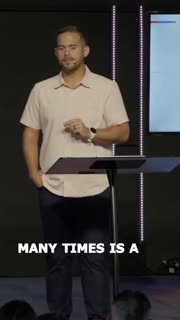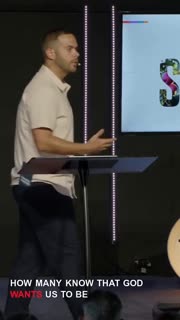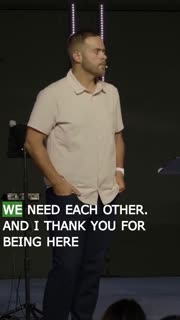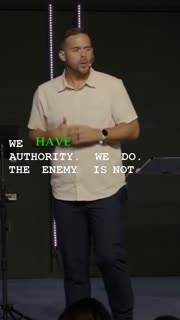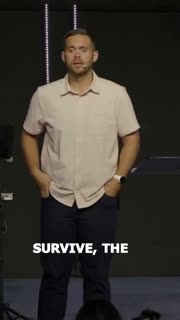Finding Hope: Overcoming Depression Through Elijah's Journey
Devotional
Sermon Summary
Bible Study Guide
Sermon Clips
1. "Depression many times is a signal that something isn't right, not a malfunction. Let me say that again. Depression sometimes means that something is not right. It doesn't mean that there is a malfunction inside of you. You are not weak. You're not. You're not crazy if you struggle with depression or anxiety. You may just have some unmet needs or things may be unbalanced in your life that you need to bring order to." [07:30] (26 seconds)
2. "How many know that God wants us to be free, right? God wants us to be free. He wants us to be happy. The goal of life is not happiness, though. God wants us to be full of joy. How many know He wants us to be full of joy? He also wants us to have a life of meaning and purpose. Jesus, the reason why He came is actually to make us free." [08:24] (21 seconds)
3. "We have become so overwhelmed by over committing to too many things. And it is leading to us to be in a place where we are struggling to manage. Therefore, our minds. Our minds are struggling to cope with our pace. Can I tell you that not everything that is doable is sustainable? Not everything that is doable is sustainable in your life. Maybe for a season, but you can't go for too long. Some of you are running at a pace that is just so quick you're heading towards a breakdown." [17:01] (32 seconds)
4. "The thief's purpose is to steal and to kill and to destroy. My purpose is to, what, give them a rich and a satisfying life. And so what is the enemy doing with social media? He's stealing our time. He's killing our joy. And what else is he doing? He's destroying. He's destroying our relationships and our life. We waste our time focusing on what everyone else is doing and thinking less of ourselves in the process." [24:43] (30 seconds)
5. "We need each other. And I thank you for being here today. If you're able to, be here as much as possible. I love online. It's great to reach people that can't make it here in person, but we need to be together. We need to worship together. We need to learn together. We need to pray together. When we see our neighbor crying, we need to be there for them, and to go over and pray for them. We need one another. When the doors are open, be here." [40:45] (28 seconds)
6. "We have authority. We do. The enemy is not stronger than us with God on our side. And the enemy knows that. And so he wants you to focus so much on the little strength that you have that you forget about who's on your side. And so when you go through seasons, when you feel depressed, anxious, or whatever, don't let it become a season where you break down because you have the strength, the ability to overcome on your side through God." [44:02] (32 seconds)
7. "The Lord wants you to break free, not break down. Would you bow your heads with me this morning? I think one of the reasons why this message has spoken to me so much as I prepared for it is because I constantly find myself in moments and days and seasons where the enemy is trying his best to get me into a season of depression, to experience a breakdown. Because honestly, if I were to break down, it affects my family. It affects the way that I lead this church. It affects every area of my life." [48:12] (60 seconds)
Ask a question about this sermon
2. "How many know that God wants us to be free, right? God wants us to be free. He wants us to be happy. The goal of life is not happiness, though. God wants us to be full of joy. How many know He wants us to be full of joy? He also wants us to have a life of meaning and purpose. Jesus, the reason why He came is actually to make us free." [08:24] (21 seconds)
3. "We have become so overwhelmed by over committing to too many things. And it is leading to us to be in a place where we are struggling to manage. Therefore, our minds. Our minds are struggling to cope with our pace. Can I tell you that not everything that is doable is sustainable? Not everything that is doable is sustainable in your life. Maybe for a season, but you can't go for too long. Some of you are running at a pace that is just so quick you're heading towards a breakdown." [17:01] (32 seconds)
4. "The thief's purpose is to steal and to kill and to destroy. My purpose is to, what, give them a rich and a satisfying life. And so what is the enemy doing with social media? He's stealing our time. He's killing our joy. And what else is he doing? He's destroying. He's destroying our relationships and our life. We waste our time focusing on what everyone else is doing and thinking less of ourselves in the process." [24:43] (30 seconds)
5. "We need each other. And I thank you for being here today. If you're able to, be here as much as possible. I love online. It's great to reach people that can't make it here in person, but we need to be together. We need to worship together. We need to learn together. We need to pray together. When we see our neighbor crying, we need to be there for them, and to go over and pray for them. We need one another. When the doors are open, be here." [40:45] (28 seconds)
6. "We have authority. We do. The enemy is not stronger than us with God on our side. And the enemy knows that. And so he wants you to focus so much on the little strength that you have that you forget about who's on your side. And so when you go through seasons, when you feel depressed, anxious, or whatever, don't let it become a season where you break down because you have the strength, the ability to overcome on your side through God." [44:02] (32 seconds)
7. "The Lord wants you to break free, not break down. Would you bow your heads with me this morning? I think one of the reasons why this message has spoken to me so much as I prepared for it is because I constantly find myself in moments and days and seasons where the enemy is trying his best to get me into a season of depression, to experience a breakdown. Because honestly, if I were to break down, it affects my family. It affects the way that I lead this church. It affects every area of my life." [48:12] (60 seconds)
